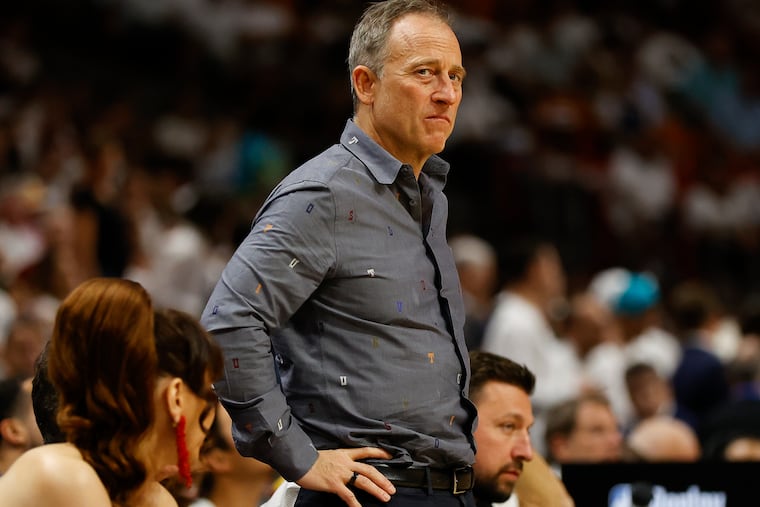FBI interviewed Sixers owner Josh Harris in George Norcross racketeering probe
Harris, a billionaire private equity executive and founder of Harris Blitzer Sports & Entertainment, met with investigators on May 6, records show. He hasn’t been accused of wrongdoing.

Sixers co-owner Josh Harris was interviewed by the FBI last year in connection with New Jersey prosecutors’ criminal racketeering case against Democratic power broker George E. Norcross III, according to court records.
Harris, a billionaire private equity executive and founder of Harris Blitzer Sports & Entertainment, met with investigators on May 6, records show. The documents do not say why agents wanted to speak with Harris or what they discussed. He hasn’t been accused of wrongdoing, and authorities have said they interviewed dozens of people in the probe.
Part of prosecutors’ case against Norcross involves New Jersey lawmakers’ passage of economic-development legislation in 2013 that boosted tax incentives for companies that invested in Camden. The 76ers were among several companies that took advantage of that program, building a practice facility in the city.
Harris, 60, is managing partner of the 76ers and the NFL’s Washington Commanders, as well as comanaging partner of the NHL’s New Jersey Devils.
He joins a roster of high-profile leaders in business, politics, and labor in the Philadelphia region who have been interviewed by investigators, worked on projects at the center of the case, or otherwise been connected to the yearslong investigation of Norcross, including developer Carl Dranoff, real estate executive William P. Hankowsky, investor Ira Lubert, and former electricians’ union leader John J. Dougherty.
» READ MORE: Newly released FBI wiretap documents reveal glimpse of George Norcross-John Dougherty relationship
A spokesperson for Harris Blitzer declined to comment.
New Jersey Attorney General Matthew J. Platkin unveiled a 13-count indictment against Norcross and five associates in June, accusing them of using threats of economic and reputational harm — and their political control over government agencies — to obtain valuable waterfront property in Camden and millions of dollars in tax credits.
Norcross, an insurance executive, and his codefendants have pleaded not guilty to charges, which include racketeering and extortion. They have asked a judge to dismiss the charges, saying the allegations described in the indictment do not amount to crimes.
Harris’ name was mentioned on a list of FBI interview subjects that was attached to a Dec. 27 defense motion asking a judge to order the Attorney General’s Office to share certain documents. In addition to Harris, FBI agents interviewed a developer who worked on the 76ers’ Camden practice facility, court records show.
The disclosure of Harris’ FBI interview comes during a politically sensitive time for the Sixers. The team this week reversed course on its plans to build a Center City arena, opting instead to stay in South Philly and build a new arena there in a partnership with a Comcast subsidiary. Harris appeared alongside Mayor Cherelle L. Parker and other officials during a news conference Monday to discuss the new plan.
The announcement came just weeks after City Council voted to approve the controversial proposal to build a $1.3 billion arena in Center City — even as New Jersey Gov. Phil Murphy tried to lure the 76ers to Camden with a promise of hundreds of millions of dollars in tax credits.
Prosecutors say Norcross led a criminal enterprise made up of government officials, businesspeople, and lawyers. One of the organization’s objectives was to influence the New Jersey Legislature to pass economic-development legislation in 2013 “in a manner that greatly increased tax credit awards for projects in Camden and was tailor-made to advance the interests” of Norcross and his friends, the indictment says.
The 76ers were one of many companies that benefited from the legislation, known as the Economic Opportunity Act. In 2014 the New Jersey Economic Development Authority awarded the team $82 million in tax credits over 10 years to build a new practice facility and headquarters in Camden.
As with other projects in Camden, that meant that for each dollar the team invested in the facility, it could later recoup the same amount in tax credits, as long as it met conditions such as employing a certain number of people there.
In discussions with the Economic Development Authority, the team was represented by the law firm Parker McCay, whose CEO is George Norcross’ brother Philip, now a codefendant in the racketeering case.
Attorneys for Philip Norcross wrote in an October court filing that their client’s involvement in influencing legislation was protected by the constitutional right to petition the government. “The state’s attempt to convert his constitutionally protected petitioning conduct into the aim of a criminal RICO enterprise should be rejected out of hand,” wrote Kevin H. Marino, John D. Tortorella, and Erez J. Davy.
The Norcross brothers’ involvement in shaping the Economic Opportunity Act was not itself a criminal act, prosecutors say. “Rather, Philip Norcross’s (and George Norcross’s) influence over the Legislature simply provides background on the political power and objectives of the Enterprise, which, like virtually any RICO enterprise, engages in both lawful and unlawful activities,” prosecutors Michael D. Grillo and Adam D. Klein wrote in a November court filing.